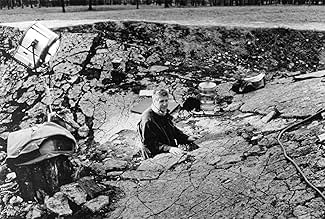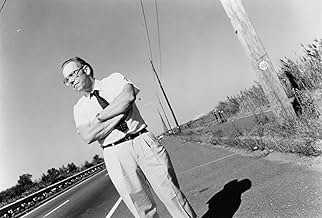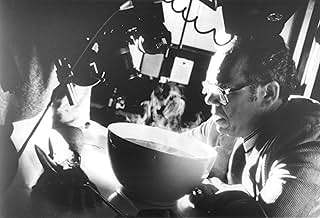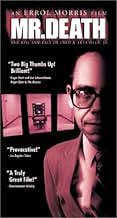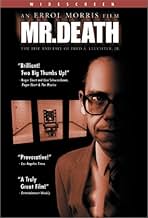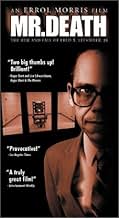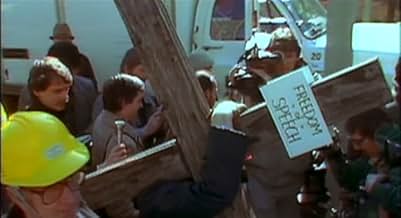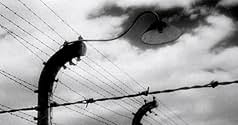IMDb रेटिंग
7.5/10
5.9 हज़ार
आपकी रेटिंग
अपनी भाषा में प्लॉट जोड़ेंA cinematic portrait of the life and career of the infamous American execution device designer and holocaust denier.A cinematic portrait of the life and career of the infamous American execution device designer and holocaust denier.A cinematic portrait of the life and career of the infamous American execution device designer and holocaust denier.
- पुरस्कार
- 1 जीत और कुल 8 नामांकन
Fred A. Leuchter Jr.
- Self
- (as Fred Leuchter)
Caroline Leuchter
- Self
- (वॉइस)
Adolf Hitler
- Self - Leaves Plane
- (आर्काइव फ़ूटेज)
- (बिना क्रेडिट के)
Errol Morris
- Self - Interviewer
- (वॉइस)
- (बिना क्रेडिट के)
फ़ीचर्ड समीक्षाएं
He seems to be concocted by a joint effort between Flannery O'Connor and Philip Roth: Fred A. Leuchter, Jr. builds more humane death technology. He brings electric chairs into the twentieth century and suggests that TV sets be brought into the killing room for the victims of lethal injection. For a while, the director Errol Morris is fascinated by the visual properties of geeky, big-gummed, brown-suited Fred, who reveals his churning interior self in only one way: he confesses to consuming forty cups of coffee and six packs of cigarettes a day. He seems like the obsessive, narrowly niche-defined folk of Morris' FAST, CHEAP AND OUT OF CONTROL--AI geeks and topiary gardeners. Then history intervenes.
A Holocaust denier on trial for libel in Canada calls Fred as his star witness, proclaiming this mix of Babbitt and Kevorkian as a world-class expert. And so Fred takes his bride (the waitress who served him his daily forty cups) on a honeymoon to Auschwitz, where, in an almost comic act of desecration, he hacks chunks of brick from the deathhouse walls to prove they contain no Zyklon B. After pride cometh a fall, and Fred is ruined--and in the process Morris has minted a meditation on the roots of evil that joins together "Twin Peaks" and Sophocles.
The most tightly focussed and probably the best of Morris' documentary features, MR. DEATH is probably the most eloquent spokesman of Morris' continuing theme--the metaphysical delusions ordinary mortals use to get through their very mortal days and nights.
A Holocaust denier on trial for libel in Canada calls Fred as his star witness, proclaiming this mix of Babbitt and Kevorkian as a world-class expert. And so Fred takes his bride (the waitress who served him his daily forty cups) on a honeymoon to Auschwitz, where, in an almost comic act of desecration, he hacks chunks of brick from the deathhouse walls to prove they contain no Zyklon B. After pride cometh a fall, and Fred is ruined--and in the process Morris has minted a meditation on the roots of evil that joins together "Twin Peaks" and Sophocles.
The most tightly focussed and probably the best of Morris' documentary features, MR. DEATH is probably the most eloquent spokesman of Morris' continuing theme--the metaphysical delusions ordinary mortals use to get through their very mortal days and nights.
Errol Morris has certainly 'injected' (pardon my contextural
pun) a bit of energy into the documentary form, even if the
films he makes lie somewhere outside its confines. Mr Death,
with its characteristic visual flourishes and tangents, is no
exception to this, though it does contain excerpts of a 'true'
documentary of Leuchter pilfering 'evidence' from Auschwitz.
Morris' film refutes Leuchter's findings to the point that the
only viewer who would give tham any credence would have to be as
biased as Ernst Zündel, the revisionist publisher whom
Leuchter's testimony defended. One detail of the film sticks out
in my mind... the home movies of young Leuchter accompanying his
father to work at the local prison, where he pals around with
the convicts, and explains how he learned at this tender age to
pick locks, pockets and safes... and with audible smugness
relates that these skills have actually aided him later in life.
The image of this boy nebbish, undoubtedly an outcast and loner
at school and socially, gaining acceptance amongst the convicts
helps to explain why such an intelligent and resourceful person
could be duped by the likes of the pinheaded, hateful Neo-Nazi
Revisionists. Here's a group of 'bad guys' accepting, applauding, listening and agreeing to Leuchter. Of course this
is because his undeniably faulted research supports their own
misguided conclusions. But it mirrors his experiences as a boy
among the convicts and provides a strong psychological
foundation for Leuchter's downfall into his delusional world. I'd recommend this film to anyone who enjoys thought-provoking
cinema, realizing that they are sadly in a minority amongst
filmgoers.
pun) a bit of energy into the documentary form, even if the
films he makes lie somewhere outside its confines. Mr Death,
with its characteristic visual flourishes and tangents, is no
exception to this, though it does contain excerpts of a 'true'
documentary of Leuchter pilfering 'evidence' from Auschwitz.
Morris' film refutes Leuchter's findings to the point that the
only viewer who would give tham any credence would have to be as
biased as Ernst Zündel, the revisionist publisher whom
Leuchter's testimony defended. One detail of the film sticks out
in my mind... the home movies of young Leuchter accompanying his
father to work at the local prison, where he pals around with
the convicts, and explains how he learned at this tender age to
pick locks, pockets and safes... and with audible smugness
relates that these skills have actually aided him later in life.
The image of this boy nebbish, undoubtedly an outcast and loner
at school and socially, gaining acceptance amongst the convicts
helps to explain why such an intelligent and resourceful person
could be duped by the likes of the pinheaded, hateful Neo-Nazi
Revisionists. Here's a group of 'bad guys' accepting, applauding, listening and agreeing to Leuchter. Of course this
is because his undeniably faulted research supports their own
misguided conclusions. But it mirrors his experiences as a boy
among the convicts and provides a strong psychological
foundation for Leuchter's downfall into his delusional world. I'd recommend this film to anyone who enjoys thought-provoking
cinema, realizing that they are sadly in a minority amongst
filmgoers.
Leuchter is an expert in execution technology (designer of electric chairs, gas chambers, etc.), whose career was wiped out when he got swept up in the Holocaust revisionism movement (he testified, as an expert witness in a defamation suit, that the Auschwitz crematoria could not and did not serve as gas chambers). In this vivid documentary, Morris lets Leuchter speak for himself (which reveals him to be a man of limited horizons with a - let's say - quirky moral code, likely undone by hubris rather than evil [although Morris may deliberately be making that as far as possible an eye-of-the-beholder issue]), while providing a blizzard of visual accompaniments that emphasize the lurid raw material of Leuchter's life (a strategy indicated by the B-movie undertone of the title), and flirt with his obvious sense of his own heroism. Leuchter has more than enough rope here to hang himself, and pretty much gets the job done. Morris doesn't try to explore the issue of Holocaust revisionism generally, pretty much taking our revulsion on faith: if anything, from my limited previous reading on the subject, that's doing Leuchter a favor. Anyway, revulsion or not, it's hard not to be fascinated by a man who can calmly chatter about his value-pricing approach to selling death machines (although custom made, he tells us, they're sold at "off the shelf" prices).
In Errol Morris's film, "Mr. Death", Fred Leuchter Jr. comes across as a passionless, mechanical robot, fitting the engineering profession that he devoted his life to. Leuchter, the innovator of many death penalty devices and subsequently the only scientist willing to testify favorably in a celebrated Canadian trial that questioned the existence of the Holocaust, is either a hero to some or a villain to many. Morris, except for a Frankenstein-inspired opening and closing set in the film, prefers to let Leuchter be Leuchter rather than adding more contempt to a decidedly pitiful figure. The one time Morris does appear to interfere is when he asked Leuchter point blank if he could have been mistaken in any of his analysis. There are also camera tricks which render what Leuchter did as malicious, such as the split screen between what was Auschwitz and now, the slow-motion as Leuchter is chipping away at sites many Jews consider holy ground, and the phasing in and out of color and black and white film as we see Leuchter demonstrate his electric chair. The motivation behind what he did lies at the heart of "Mr. Death". He aspired to perfect the most humane killing machine because he said he believed in capital punishment, not capital torture. He cared that prison guards who knew the death-row inmates well would not have to suffer cleaning up the morbid residuals of those electrocuted. Yet he tried to carry this same mind-set in understanding the gas chambers at Auschwitz. In his mechanical mind, he asked how he could have done a better job of extermination. "Mr. Death" is an unpleasant but needed lesson about the mosaic people who live and work with each of us everyday - a people who seem anti-social yet amoral and who seem to be guided by that inner light that we can barely know or understand.
MR DEATH is one of my favourite types of documentary: those that tell a story you're completely unfamiliar with, but which turn out to be extremely compelling and indeed gripping thanks to the stuff being presented. In many ways, this is a simple story of one man's fame and later infamy, although director Morris uses it as a springboard to embrace some wider concepts, such as capital punishment and the Holocaust.
One of the important things that I took away from this was that Leuchter is no villain: just a misguided man who didn't necessarily deserve all the hatred aimed at him. Yes, he made a grievous mistake, but to destroy his life as a result of that error? "Let he who is without sin...", etc. The political side of the documentary is especially interesting as a result.
One of the important things that I took away from this was that Leuchter is no villain: just a misguided man who didn't necessarily deserve all the hatred aimed at him. Yes, he made a grievous mistake, but to destroy his life as a result of that error? "Let he who is without sin...", etc. The political side of the documentary is especially interesting as a result.
क्या आपको पता है
- ट्रिवियाAccording to A Brief History of Errol Morris (2000), Morris made a rough cut that he showed to colleagues and friends that only had Leuchter interviewed and it was Morris' intention that the audience would understand he was saying things either as lies or flat-out wrong. He was advised to go to Auschwitz and dig deeper so that there would be no doubt for the audience that Leuchter was wrong.
- भाव
Fred A. Leuchter Jr.: The human body is not easy to destroy and it's not easy to take a life humanely and painlessly without doing a great deal of damage to the individual's body.
टॉप पसंद
रेटिंग देने के लिए साइन-इन करें और वैयक्तिकृत सुझावों के लिए वॉचलिस्ट करें
- How long is Mr. Death: The Rise and Fall of Fred A. Leuchter, Jr.?Alexa द्वारा संचालित
विवरण
- रिलीज़ की तारीख़
- कंट्री ऑफ़ ओरिजिन
- भाषा
- इस रूप में भी जाना जाता है
- Mr. Death
- फ़िल्माने की जगहें
- उत्पादन कंपनियां
- IMDbPro पर और कंपनी क्रेडिट देखें
बॉक्स ऑफ़िस
- US और कनाडा में सकल
- $5,07,941
- US और कनाडा में पहले सप्ताह में कुल कमाई
- $24,125
- 2 जन॰ 2000
- दुनिया भर में सकल
- $5,07,941
- चलने की अवधि1 घंटा 31 मिनट
- रंग
- ध्वनि मिश्रण
- पक्ष अनुपात
- 1.85 : 1
इस पेज में योगदान दें
किसी बदलाव का सुझाव दें या अनुपलब्ध कॉन्टेंट जोड़ें

टॉप गैप
By what name was Mr. Death: The Rise and Fall of Fred A. Leuchter, Jr. (1999) officially released in Canada in English?
जवाब
